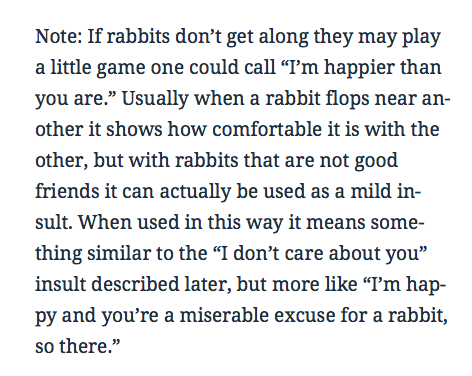Photo

Hymn to Amun, verse 90 from Papyrus Leiden I 350.
The idea of multiple persons (images) of God joined in one as hypostases predates Christianity by a few millennia.
133 notes
·
View notes
Text

i've always wanted to do a fanart so finally had time to get one done!! bocchi and her gals ^_^
3K notes
·
View notes
Text
Not just tsukumogami, but also the extended mind thesis from Clark and Chalmers.
I think any inanimate thing you regularly care for becomes a little alive.
22K notes
·
View notes
Text
Being the First Part of a Collation and Collection of Materials towards a Work on the Reception History of the Classical Greek Myths on the Hellsite, Known Also as Tumblr,
and its Manifold Effects upon and Reflections of the Minds of the Inhabitants thereof,
Perhaps with Some Sundry Comments upon the Nature of the Matthew Effect,
in which One Kind of Mythology Predominates as Common Intellectual Currency among these Worthies,
Functioning as a Small Reference Pool and Allowing Certain Reflexive Habits
that May Charitably be Called Intellectual and Uncharitably be Called Self-Congratulatory,
the Judgment of Which is Left to the Gentle Reader,
for the Endless River of Discourse and Dialectic Flows Evermore,
and this Author has No Stomach for Casting a Stone into its Depths,
Believing that Time will Shew Our Discussions upon These Topics
to be as Divisive and Fruitful as the Moving of Ancestral Tablets During the Spring and Autumn,
and Yet Still Believing that Each Person Plays a Part in Working Out Geist,
and that a Shared Mythology may Indeed be Both Illuminating and Imprisoning Simultaneously,
and that the Self-Same Qualities of Myth may Contribute to Both
If you see this in the wild please reblog the following version instead:
#mythology#fun with 18th century titles#purposefully anachronistic#fun with links and connections and thoughts#a deleted line: as Seen#for Example#in the Many Reflections upon the Person of Jeong Dojeon
989 notes
·
View notes
Text
Being Part the Second of a Collation, &c.
cf. https://www.tumblr.com/mag200/708200436325302272:
one thing about orpheus and eurydice is you guys are all like “i’m different i wouldnt turn to look at her” because you are all familiar with the story of orpheus and eurydice. but orpheus wasnt familiar with the story because he was in it lol.
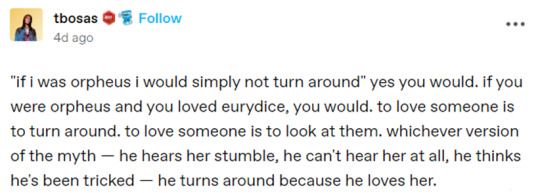


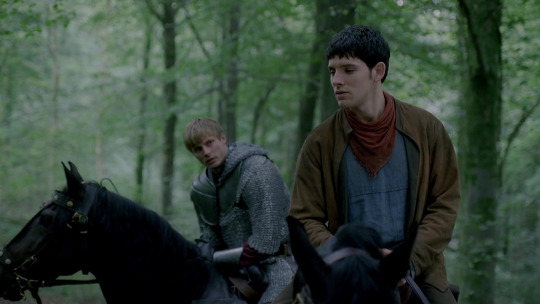
this post & merthur
4K notes
·
View notes
Text

Gregory Orr, from ‘Orpheus & Eurydice: A Lyric Sequence’
10K notes
·
View notes
Text
In the past I've shared other people's musings about the different interpretations of the myth of Orpheus and Eurydice. Namely, why Orpheus looks back at Eurydice, even though he knows it means he'll lose her forever. So many people seem to think they've found the one true explanation of the myth. But to me, the beauty of myths is that they have many possible meanings.
So I thought I would share a list of every interpretation I know, from every serious adaptation of the story and every analysis I've ever heard or read, of why Orpheus looks back.
One interpretation – advocated by Monteverdi's opera, for example – is that the backward glance represents excessive passion and a fatal lack of self-control. Orpheus loves Eurydice to such excess that he tries to defy the laws of nature by bringing her back from the dead, yet that very same passion dooms his quest fo fail, because he can't resist the temptation to look back at her.
He can also be seen as succumbing to that classic "tragic flaw" of hubris, excessive pride. Because his music and his love conquer the Underworld, it might be that he makes the mistake of thinking he's entirely above divine law, and fatally allows himself to break the one rule that Hades and Persephone set for him.
Then there are the versions where his flaw is his lack of faith, because he looks back out of doubt that Eurydice is really there. I think there are three possible interpretations of this scenario, which can each work alone or else co-exist with each other. From what I've read about Hadestown, it sounds as if it combines all three.
In one interpretation, he doubts Hades and Persephone's promise. Will they really give Eurydice back to him, or is it all a cruel trick? In this case, the message seems to be a warning to trust in the gods; if you doubt their blessings, you might lose them.
Another perspective is that he doubts Eurydice. Does she love him enough to follow him? In this case, the warning is that romantic love can't survive unless the lovers trust each other. I'm thinking of Moulin Rouge!, which is ostensibly based on the Orpheus myth, and which uses Christian's jealousy as its equivalent of Orpheus's fatal doubt and explicitly states "Where there is no trust, there is no love."
The third variation is that he doubts himself. Could his music really have the power to sway the Underworld? The message in this version would be that self-doubt can sabotage all our best efforts.
But all of the above interpretations revolve around the concept that Orpheus looks back because of a tragic flaw, which wasn't necessarily the view of Virgil, the earliest known recorder of the myth. Virgil wrote that Orpheus's backward glance was "A pardonable offense, if the spirits knew how to pardon."
In some versions, when the upper world comes into Orpheus's view, he thinks his journey is over. In this moment, he's so ecstatic and so eager to finally see Eurydice that he unthinkingly turns around an instant too soon, either just before he reaches the threshold or when he's already crossed it but Eurydice is still a few steps behind him. In this scenario, it isn't a personal flaw that makes him look back, but just a moment of passion-fueled carelessness, and the fact that it costs him Eurydice shows the pitilessness of the Underworld.
In other versions, concern for Eurydice makes him look back. Sometimes he looks back because the upward path is steep and rocky, and Eurydice is still limping from her snakebite, so he knows she must be struggling, in some versions he even hears her stumble, and he finally can't resist turning around to help her. Or more cruelly, in other versions – for example, in Gluck's opera – Eurydice doesn't know that Orpheus is forbidden to look back at her, and Orpheus is also forbidden to tell her. So she's distraught that her husband seems to be coldly ignoring her and begs him to look at her until he can't bear her anguish anymore.
These versions highlight the harshness of the Underworld's law, and Orpheus's failure to comply with it seems natural and even inevitable. The message here seems to be that death is pitiless and irreversible: a demigod hero might come close to conquering it, but through little or no fault of his own, he's bound to fail in the end.
Another interpretation I've read is that Orpheus's backward glance represents the nature of grief. We can't help but look back on our memories of our dead loved ones, even though it means feeling the pain of loss all over again.
Then there's the interpretation that Orpheus chooses his memory of Eurydice, represented by the backward glance, rather than a future with a living Eurydice. "The poet's choice," as Portrait of a Lady on Fire puts it. In this reading, Orpheus looks back because he realizes he would rather preserve his memory of their youthful, blissful love, just as it was when she died, than face a future of growing older, the difficulties of married life, and the possibility that their love will fade. That's the slightly more sympathetic version. In the version that makes Orpheus more egotistical, he prefers the idealized memory to the real woman because the memory is entirely his possession, in a way that a living wife with her own will could never be, and will never distract him from his music, but can only inspire it.
Then there are the modern feminist interpretations, also alluded to in Portrait of a Lady on Fire but seen in several female-authored adaptations of the myth too, where Eurydice provokes Orpheus into looking back because she wants to stay in the Underworld. The viewpoint kinder to Orpheus is that Eurydice also wants to preserve their love just as it was, youthful, passionate, and blissful, rather than subject it to the ravages of time and the hardships of life. The variation less sympathetic to Orpheus is that Euyridice was at peace in death, in some versions she drank from the river Lethe and doesn't even remember Orpheus, his attempt to take her back is selfish, and she prefers to be her own free woman than be bound to him forever and literally only live for his sake.
With that interpretation in mind, I'm surprised I've never read yet another variation. I can imagine a version where, as Orpheus walks up the path toward the living world, he realizes he's being selfish: Eurydice was happy and at peace in the Elysian Fields, she doesn't even remember him because she drank from Lethe, and she's only following him now because Hades and Persephone have forced her to do so. So he finally looks back out of selfless love, to let her go. Maybe I should write this retelling myself.
Are any of these interpretations – or any others – the "true" or "definitive" reason why Orpheus looks back? I don't think so at all. The fact that they all exist and can all ring true says something valuable about the nature of mythology.
23K notes
·
View notes
Text
From the tags:
#tl;dr#my parents have a shiny new temple 5 minutes from my childhood home#I have never been there#i make them drive me to one half an out that dates to the 1800s#this is not how Hinduism works#this is just how my very human mind works#let me sit in the grove with the old stones#that they carved before my people were free#let me fill the well I drink from#with my hopes and devotions#religion#colonialism#animism#kinda#hinduism#magical thinking#faith#belief#tbh i just like when things are old and in use still
I think any inanimate thing you regularly care for becomes a little alive.
22K notes
·
View notes
Text
That time shall be the time of great peace, perhaps even a 太平, for the word YARZG will appear, but in that peace will be sown the seeds of disorder as surely as wood grows from water and yang grows from yin. These seeds will be both obvious and subtle as the ways of the unseen one, which permeate all yet are touched by none.
I.
The first of these seeds, the first to appear, the first which shall usher in the caturyuga, shall be the use of words of more than five letters. This use will at first be tentative, for at first all will be believe the limit of five letters to be sacred, but the wielding of SONDER against JOROL and the strength of the emotion thereof shall prove decisive.
Ruin shall come quickly to that age; word will contend against word, and people will soon realise that to limit themselves to that frame is to invite their own destruction. What clashes here of wills gen wonts, oystrygods gaggin fishy-gods! Brékkek Kékkek Kékkek Kékkek! Kóax Kóax Kóax! Ualu Ualu Ualu! Quaouauh! And so this shall be the age of unbinding.
II.
The second seed, the second to appear, that which will herald the second age of the चतुर्युग, shall be the use of words from other languages. All shall be overthrown, and the cult of Sapir-Whorf will rise from the ashes. This shall be an age of great instability as well as an age of great invention, for the field will be wide open as to how quickly words can be pronounced as well as how they can be written.
Abjad will rise against abugida; axe will hew axe. The chanters will meditate for inner peace and outer violence, developing the diaphragm in order to utter words in as few breaths as possible. The masters of seal and script will inscribe words on bones and bury them so that the words, when encountered, will explode into consciousness.
The refrainers will wear blindfolds, ceasing their sightfulness and stopping their hearfulness so that they do not encounter words, vainly attempting to leave the conflict. But this will not be possible, for awareness is not the same as escape, much less unawareness; tlalticpac is slippery, slick, and people will fall into evil as they slip in the mud. And this age will last a long time.
III.
The third seed, the third to appear, that which will herald the third age, will be the rise of the philologists, the lexicologists, the dictionary makers, the phonologists---those who keep their head and eyes downward, those interested in roots and beginnings.
Even as they stay trapped within their age they will attempt to analyse it; they will try to order the grammar of the world. For them, there is no deformity but in Monstrosity; wherein, notwithstanding, there is a kind of Beauty, Nature so ingeniously contriving the irregular parts, as they become sometimes more remarkable than the principal Fabrick.
Punctuation will be debated; words will be defined. They will look at their time and debate if they live in the degenerate age, if they are in the 末法, or if in fact they have looped all the way round to the 正法. The wise will contend over whether the कलियुग is equivalent to the 末法; reaching no consensus, they will pronounce themselves foolish.
They will search for the hidden structures, the first principles behind words. They will discuss whether true harmony comes from ἁρμός, a joint, or if it comes from 和, the concatenation of grain and a mouth. Order will not only be restored: it will proliferate, so that there are many orders, and none will know which is whole and which is partial. Those caught in this whirlpool will forget years, forget justice, be stimulated by the limitless, and thus remain in the limitless.
IV.
And then will come the sprouting of the fourth seed, the fourth to appear. The roots of this age will be sown in the one before it, in the call to first principles over the parochialism of the local. Everything will change when the mathematicians attack. But that is another tale for a another time, to be told by someone of greater worthynesse than I. Hwæt!
Wordle is running out of words. Only 2,000 five letter words remain. When that supply is exhausted the Creation shall begin. One day the word will be ZHURM, and all shall get it, and all shall understand it to mean "an ache from suddenly remembering a long-ago friend, who meant something to you once, but whose face you can no longer conjure". The next day the word shall be JOROL, and all will get it, and all will know it means "the melancholy confusion of passing by somewhere where you once could have died". The next day it will be GREFT, and all will understand it to be a small brown bird with white streaks found only in South America, and suddenly, it will appear, in the underbrush of the Amazon, in the streets of São Paulo, and all will know that it once was not there, but now, will always be
#Borges and Deleuze inspired#also from Justin E. H. Smith#and some Foucault#fun with script theories#inspired by Chaucer and Wang Fuzhi and Gwern and the Odyssey#there's a Samuel Johnson reference in there too#and Gadamer and some Aztec philosophy#The order of verbatim quotes is: Joyce Sahagun Tolkien and finally Zhuangzi translated by A C Muller#speculative fiction#1 2 3 4 1#a fable#the joke about the mathematicians is a reference to both ATLA and SMBC#and maybe a sequel hook
18K notes
·
View notes
Photo
[Distinctions vs dichotomies, emptiness vs openness vs blandness, Wang Bi and Guo Xiang, Plotinus]
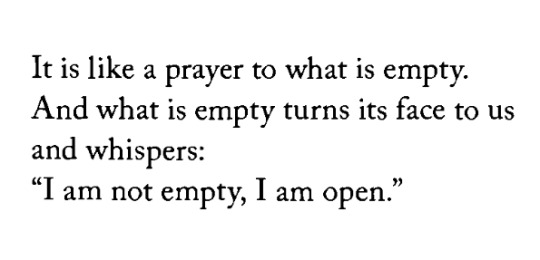
Tomas Tranströmer, tr. by Robert Bly, from a poem titled “Track,”
8K notes
·
View notes
Photo
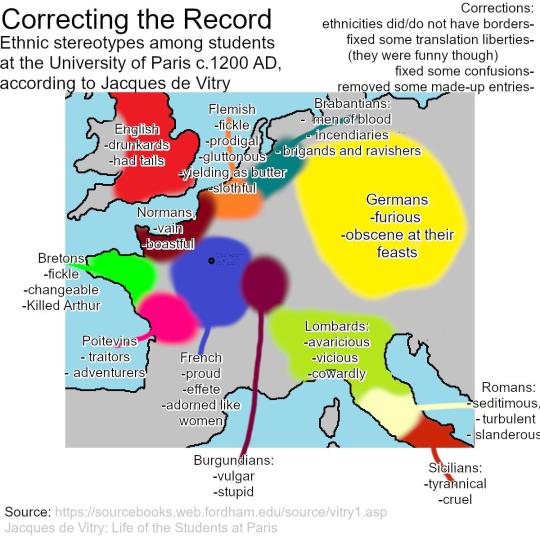
Corrected Version: Ethnic stereotypes among students at the University of Paris c.1200 AD, according to Jacques de Vitry
813 notes
·
View notes
Text
[Sociological stories, stories of systems rather than people--and yet the interest comes from the people caught in systems, the need to balance the two]
I want a story about a king whose son is prophesied to kill him so the king is like “whatever what am I supposed to do, kill my own kid wtf is wrong with you” so he just raises him as normal, doesn’t even tell him about the prophecy, and instead of some convoluted twist of events that leads to the king’s murder the son grows up and when the king is very old and dying and in excruciating pain the kid is just like alright I'mma put him out of his misery.
481K notes
·
View notes
Text
[National stereotypes, regional stereotypes, "life reflects art," the fog of London, Oscar Wilde, "if I didn't see you, from your speech I would have thought you were a native speaker," but I am a native speaker.]

100K notes
·
View notes
Text
[4E, the environment, Mencius on weeds]
human brain is so easy to manipulate its stupid. sun is out longer in evening = life is worth living...read some negative social media posts = everybody hates me...read one interesting article = i have the scholar's ambition
38K notes
·
View notes


